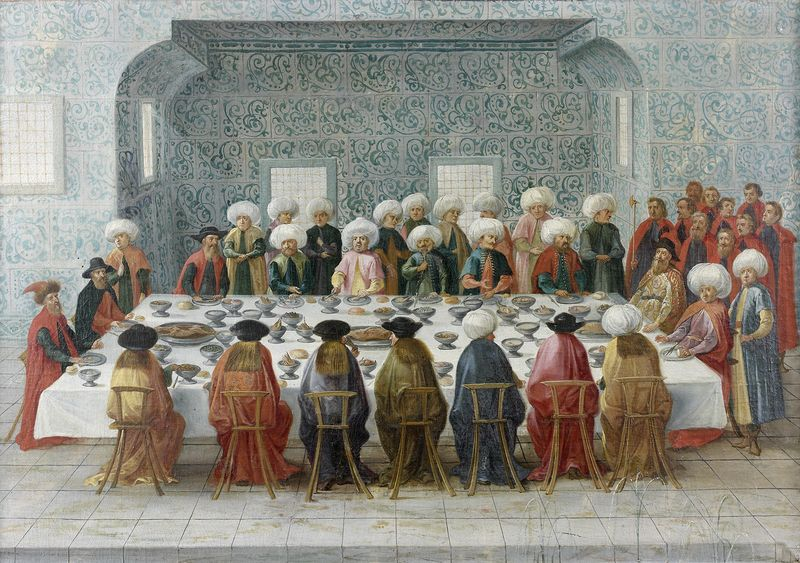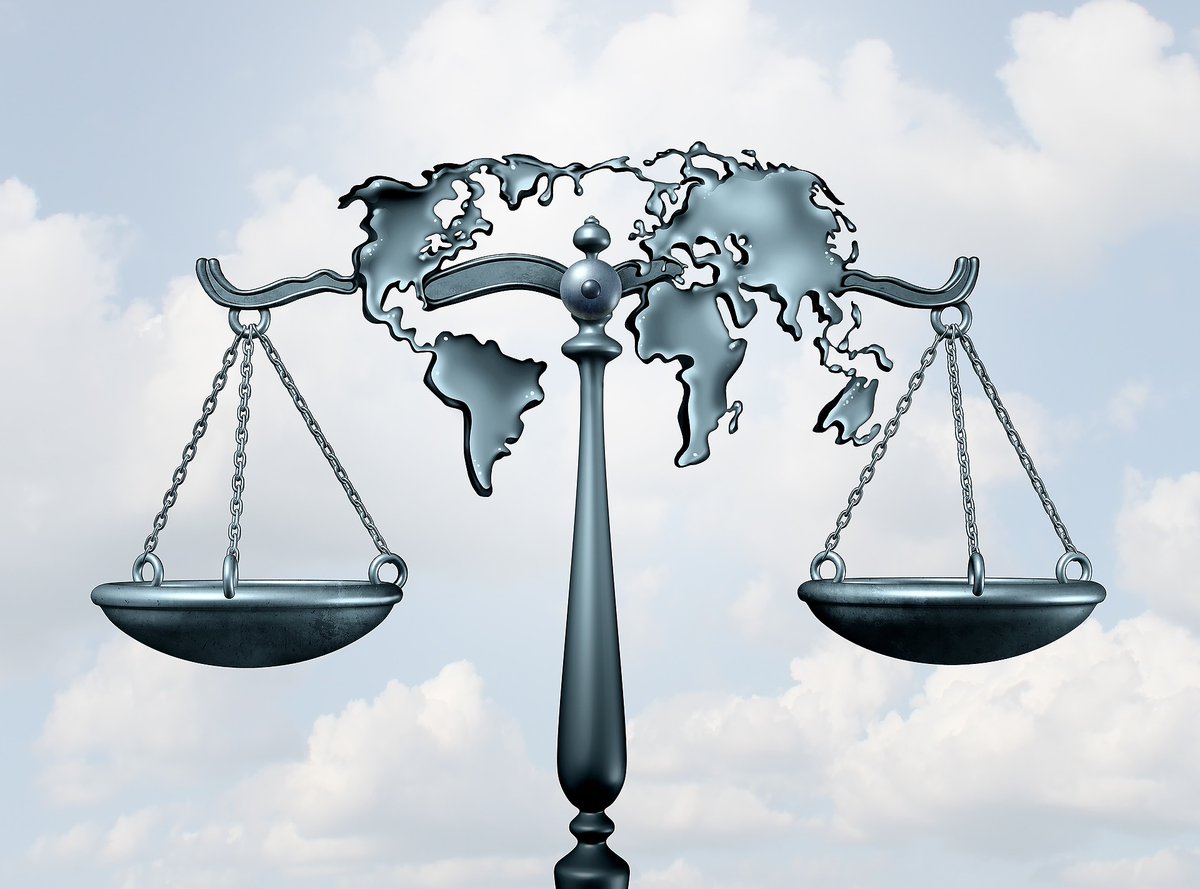.jpg)
THE CONTRIBUTIONS OF MUSLIMS TO THE LAW OF NATIONS
The formation of international law, that is, the establishment of the rules that nations have to abide by in their relations with each other, has not been easy. Since these are based on expediency and power. By whom and how should these rules be implemented? The book De iure belli ac pacis (On the Law of War and Peace), published in 1625, by Hugo Grotius, a Dutch jurist, is considered the basis of efforts to establish a supranational law.
However, the first work known in the world in this field was written by Muslims in the 8th century. The work called al-Siyar al-Kabir, which belongs to Muhammed al-Shaybani, a student of Imam Abu Hanifa, was translated into Turkish and published for the newly formed army members to read during the reign of Sultan Mahmud II.
The foresighted ijtihads (legal interpretations) of Imam Abu Hanifa, especially regarding the law of nations and citizenship, are of great value for Muslims who will have to live in countries dominated by non-Muslims centuries later. Muslims, regardless of agreements, saw international relations as a domestic law arrangement, that is, they limited themselves to certain rules in a noble manner. Treaties, the status of ambassadors, launching a war, the arrival and departure of foreigners, conditions of war prisoners, ghanimah (spoils of war), trees, animals and waters were always regulated.
The famous French international jurist Henri Bonfils (1835-97) said that the foundation of international law lies in the following two lines of Hafez Shirazi: "The safety of both worlds is in these two words, being trustworthy to friends, getting along well with enemies."
Many States, One Nation
According to Sharia law, the world is divided into two domains as Dar al-Islam and Dar al-Harb (Dar al-Kufr). The Arabic singular form "dar" means "land" or "country". Dar al-Islam is a country where Muslims are dominant and sharia law prevails, even if Muslims may not be the majority in numbers. Here, Muslims and non-Muslims live in safety. The airspace and territorial waters of dar al-Islam are also included in the Dar al-Islam.
Despite being governed by separate governments, all Islamic countries are considered Dar al-Islam as one land. For example, the Ottoman Empire, The Mamluk Sultanate in Egypt and The Mughal Empire in India were always Dar al-Islam. Their citizens were free to travel to each others' countries.
It was impossible not to be allowed inside the border when a Muslim came from Dar al-Harb to Dar al-Islam. For this reason, the Ottoman Empire did not hesitate to open its doors to Muslim refugees and even non-Muslims refugees throughout history. (However, it is not possible to go to Saudi Arabia without permission even for Umrah now.) The Ottoman Empire is the last and best example of Dar al-Islam.
Countries such as Wallachia and Moldavia, where Muslims did not live, but under the rule of Islam, were Dar al-Dhimmah. Such places were included in Dar al-Islam. The countries dominated by "baghis", that is, by those who rebelled against the legitimate government, became Dar al-Baghy These were also included in Dar al-Islam. Just like the Ottoman Empire between 1908-1918 and 1919-1922.
The Dar al-Riddah, whose power fell into the hands of apostates (murtads) who reverted from the religion of Islam to kufr (disbelief), were also included in the Dar al-Harb.

The Reason for the War
Dar al-Harb is the opposite of Dar al-Islam. Even though Muslims are in the majority, these countries, which are dominated by non-Muslims and are not governed according to Sharia laws, are still called Dar al-Harb. The citizens of Dar al-Harb are called "harbi". The open seas and deserts that are not between the two Islamic countries are also considered as Dar al-Harb.
Some, referring to the word Dar al-Harb, said that there is a constant state of war between Muslims and non-Muslims in the world. However, what matters in the world is not war, but peace. According to Hanafi jurists, the legitimacy of war is not the disbelief of enemies, but their declaration of war against Muslims. Dar al-Harb refers to the countries against which it is always possible to wage war because there is no agreement between.
Non-Muslim countries under a treaty with a Dar al-Islam government are called Dar al-Sulh. For example, in the Classical Age of the Ottoman Empire, countries like France and tax-paying countries such as Georgia were Dar al-Sulh. These are also included in Dar al-Harb. The Muslim sailors hunting a French ship in the open sea were warned by the Sublime Porte and the ship was returned.
Transformation
Places that are Dar al-Harb transform into Dar al-Islam in three ways: 1-The place where the Muslims conquer and begin to apply the Sharia law becomes Dar al-Islam. 2-When non-Muslims living in Dar al-Harb become Muslims en masse, their lands become Dar al-Islam. 3- When the people of Dar al-Harb accept the dominance of the Muslims by paying the jizya (an annual tax levied on non-Muslim citizens), their lands turn into Dar al-Islam.
According to Imam Abu Hanifa, the conversion of Dar al-Islam into Dar al-Harb happens under three conditions: 1- Being adjacent to Dar al-Harb. 2- Enforcement of laws other than the Sharia law. 3-Non-compliance with the agreement that ensures the safety of lives and property of Muslims and dhimmis (non-Muslim citizens), that is to say, the lives and properties of Muslims and dhimmis are not protected by qisas (retaliation in kind) and diyat (compensation) according to the Sharia law.
According to Malikis, Hanbalis and Imamayn from Hanafis (Imam Abu Yusuf and Imam Muhammad Ibn Al-Hasan), the abolition of the sharia law in a place is sufficient for it to become Dar al-Harb. If possible, saving such a place is the duty of the Dar al-Islam government. The legitimacy of the Ottoman conquest of Cyprus was tied to the fact that it was conquered and became Dar al-Islam during the time of Hazrat Osman.
The fatwa was given according to Imamayn. Because that is what is appropriate for the times we live in. The Hanafi jurist Al-Jassas thought that this fatwa of Imam Abu Hanifa was given according to the idealism of the early Muslims. He said, "Having security of life and property does not make a place Dar al-Islam. A Muslim can be safe in Dar al-Harb." Ibn Abidin, on the subject of aman (safety) said, "The place where hudud (plural of hadd, punishments under the Sharia law) and qisas are not performed is Dar al-Harb." Kohestani, on the other hand, said, "If the judge does not rule according to the Sharia law in a town, that place is Dar al-Harb" (Jamee al rumouz).
The statement of Imam Al-Shafi'i "A place that is Dar al-Islam will never become Dar al-Harb" is for property. In other words, even if Dar al-Islam turns into Dar al-Harb, the property rights of the Muslims there will not be lost. When such a place is re-conquered, these properties do not become ghanimah. They are given to former Muslim owners. Otherwise, Sicily, Spain, Portugal, the Balkans, Central and Eastern Europe would have to be considered Dar al-Islam even today, which is neither legal nor reasonable.
As a matter of fact, Ibn Hajar Al-Asqalani said, "The conquest of a place in ancient times is sufficient for it to be considered Dar al-Islam. If they forbid the Muslims there to practice Sharia, then this place becomes Dar al-Kufr." (Tuhfat al-Muhtaj, IX/269). In fact, this subject, which is a purely Islamic science subject, has been turned into a political demagogy over time, and even books have been written that distort the facts.
.jpg)
From Mecca to Abyssinia
If a Dar al-Islam is occupied and conquered by non-Muslims and the application of the Sharia rules there is not interfered with, that place will remain as Dar al-Islam. (Jami al-Fusulayn) As a matter of fact, the Spaniards allowed the practice of Sharia law in Andalusia for a while. The application of Sharia law was also allowed in colonies such as India, Cyprus and Tunisia. On the other hand, Islamic lands that had been occupied by the Mongols and Crusaders turned into Dar al-Harb.
After the transformation of a Dar al-Islam into a Dar al-Harb, if the lives, properties and religion of the Muslims here are interfered with, they will have to migrate to Dar al-Islam. If this is not possible, they migrate to another non-Muslim country where they can live freely. As a matter of fact, the first Muslims in Mecca, which was then an oppressive Dar al-Harb, migrated to another Dar al-Harb, Abyssinia, under the rule of a tolerant Christian ruler.
While the rulers of the occupied Muslim lands are ostensibly under the control of the invaders, that place will continue to be Dar al-Islam if they are able to apply the Sharia law among the Muslims. If the governors and judges appointed by the invaders on the Muslims act in accordance with justice, their actions will be legitimate. Otherwise, the Muslims choose mufti (Muslim legal expert), qadi (Muslim judge) or ameer (ruler) among themselves.
This mufti leads them in Friday prayers and applies the Sharia law among them. If this is not possible, the freedom of the Muslims there will be at stake. Muslims follow the greatest scholar of their land. However, uqubat (penal) provisions do not occur between them and it becomes optional for them to comply with the provisions of muamalat (transactions). (al-Hadiqa al-nadiyya, Radd al-Muhtar)

What Matter is the Law
or example, half of the population of the country was non-Muslim during the Ottoman period. In some provinces, almost all of the population was non-Muslim. But the Ottoman Empire was still Dar al-Islam. Because the Ottoman law was always based on the Sharia rules. Now there are such countries where Muslims are the majority; however, it is a crime to enact laws according to the provisions of the Qur'an.
When the Sharia law is officially valid in a country, even if there are actions against it from time to time in practice, this place does not turn into Dar al-Harb. Except that, the rulers become sinful. This is because they have no intention of opposing the Sharia law.
The fact that some laws are in conformity with the Sharia rules, or that Muslims in countries such as Israel and Greece can practice the laws of civil status, family and inheritance, or that the adhan and Friday prayers are allowed, do not turn this place into a Dar al-Islam. The prohibition of marriage with siblings is an order of Sharia law. It is the same in almost every country in the world. One of the conditions of Friday prayer is the presence and permission of the caliph. However, even if there is no caliph, Muslims can gather and perform Friday prayers, but this does not make that place a Dar al-Islam.
Dar (country) difference has some consequences: It is considered an excuse for a Muslim in Dar al-Harb not to know the religious rules. In Dar al-harb, it is permissible for a Muslim to receive interest from harbis and to engage in fasid (corrupt) deeds with them, provided that it is for his own benefit. The crime committed by a Muslim in Dar al-harb is a sin, but this is not punishable in Dar al-Islam.
Önceki Yazılar
-
DEATH IS CERTAIN, INHERITANCE IS LAWFUL!25.06.2025
-
THE SECRET OF THE OTTOMAN COAT OF ARMS18.06.2025
-
OMAR KHAYYAM: A POET OF WINE OR THE PRIDE OF SCIENCE?11.06.2025
-
CRYPTO JEWS IN TURKEY4.06.2025
-
A FALSE MESSIAH IN ANATOLIA28.05.2025
-
WAS SHAH ISMAIL A TURK?21.05.2025
-
THE COMMON PASSWORD OF MUSLIMS14.05.2025
-
WERE THE OTTOMANS ILLITERATE?7.05.2025
-
OTTOMAN RULE BENEFITED THE HUNGARIANS30.04.2025
-
An alternative state to Istanbul in Anatolia: THE ANKARA ASSEMBLY23.04.2025